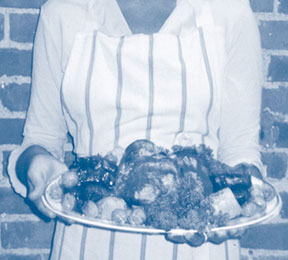Lately I’ve been interviewing individuals from the Levantine countries of Syria and Lebanon. An interesting custom that has been described to me (with slight variations) is the one where a young, single woman of marrying age would pick up the Seder tray at the very start of the Seder and leave with it to another room. During her absence those sitting at the table would sing a song or two, then call her back in when finished. Upon returning to the room with the tray, the young woman might be asked, “What is it that you have there?” (Indicating the tray), or she herself may ask them, “What is going on here?” (Indicating that they have gathered around the table and that something is about to happen.) Immediately after this brief inquiry, the leader would then begin with the first lines from the Haggadah, and with that the Seder (and Passover holiday) has officially begun. I find this custom interesting on many levels. For one it shows the importance of marriage in the community, and how it then takes the opportunity during the Seder to indicate “who is next in line.” It also elevates the act of carrying and presenting the Seder tray/plate to one of honor. Secondly, it highlights the importance of hospitality in the Middle Eastern culture, especially with regards to a woman serving a guest in her home. And thirdly, it connects the Seder, which symbolizes freedom (and therefore, the future of the Jewish people), renewal (spring season, cycle of life, fertility), with the woman’s future to getting married, raising a family, and therefore, continuing the lifeline of the Jewish community as a whole. When I first learned about this ritual my first reaction (as an American, Westerner, and New Yorker) was one of discomfort. I wondered how these young women felt to have the spotlight put on them, which basically said, “Hey, you’re single — it’s time to find a husband!” But when I asked many of these women individually how they had felt it about it, many of them instead said that they were happy to do it, and that when it was their turn, they in fact felt proud.
Jennifer Abadi | Will the single, marriageable girl please leave the room?

